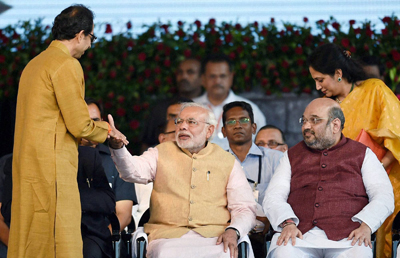 Mumbai, Nov 8: BJP and Shiv Sena today appeared to have resolved their differences with the latter deciding to nominate Rajya Sabha member Anil Desai to be included in the Union Cabinet when Prime Minister Narendra Modi reshuffles and expands his ministry tomorrow.
Mumbai, Nov 8: BJP and Shiv Sena today appeared to have resolved their differences with the latter deciding to nominate Rajya Sabha member Anil Desai to be included in the Union Cabinet when Prime Minister Narendra Modi reshuffles and expands his ministry tomorrow.
After blowing hot and cold over the last few days, the party also looked agreeable to accepting a power-sharing arrangement in Maharashtra.
"Uddhavji (Shiv Sena chief Uddhav Thackeray) had initially decided that we will not recommend any name to be included in the Modi Cabinet unless talks at the state level reach a conclusion.
"But now since the talks are finally in a conclusive mode, we have changed our stand. Our leader has decided to recommend Anil Desai's name so he can be included in the Cabinet tomorrow," a Sena MP told PTI on condition of anonymity.
He said the party leadership will decide the second name to be included in the Union Council of Ministers by evening.
The Prime Minister's Office had on Thursday asked Shiv Sena to recommend two names to be included in the Union government and the party had said it would be forwarding those the next day.
However, with back channel talks failing to resolve issues between the two parties over power-sharing in Maharashtra, Uddhav had appeared disinclined to nominate any leader to be included in the Union government.
The Sena MP said talks between the estranged former allies in Maharashtra had reached a 'conclusive stage' and a decision on supporting the BJP government during the trust vote scheduled for November 12 will be taken by the party chief tomorrow.
Uddhav Thackeray has called a meeting of newly elected Shiv Sena MLAs and top leaders tomorrow to deliberate on the developments.
"Chief Minister Devendra Fadnavis called up Uddhavji and said they want us to be a part of the new government and that they are not interested in taking the support of NCP.
We have been offered 12 ministerial berths of which 5 will be of Cabinet rank and 7 Ministers of State," he said.
It was, however, still not clear if Sena had given up on its demand for deputy chief ministership.
BJP had earlier rejected Sena's demand for following the 1995 formula when being the junior partner it had got the post of deputy chief minister.
BJP with 121 MLAs in the 288-member Assembly is the single largest party but way short of the magic figure of 145 despite support of 7 independents and some from smaller parties. 41-member NCP has declared outside support to the new government.
However, the 63 MLA-strong Sena coming on board will obviate the need for backing from Sharad Pawar's party.





Comments
Add new comment